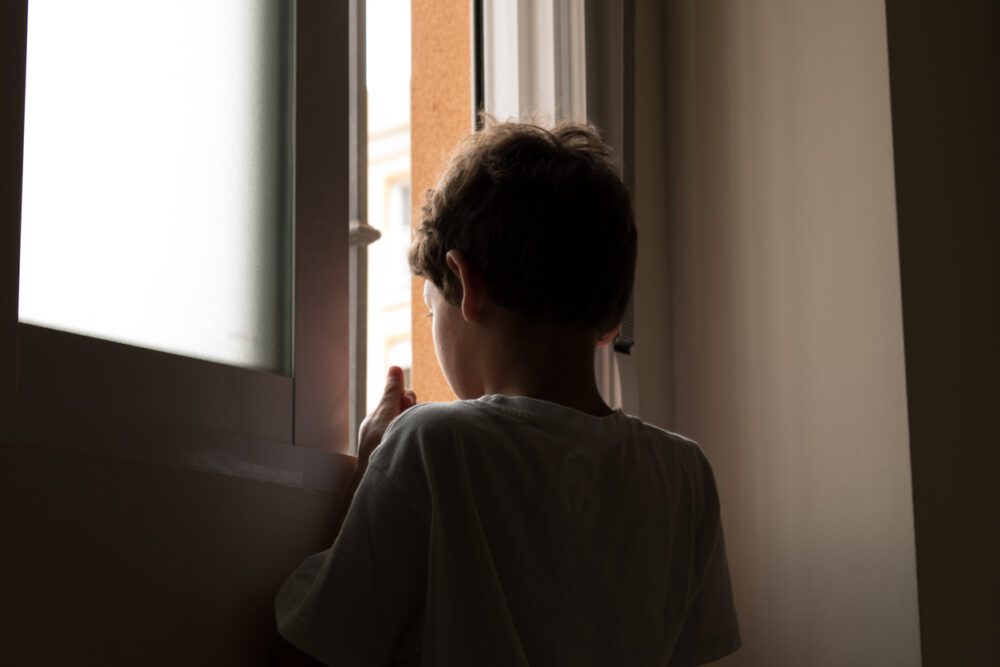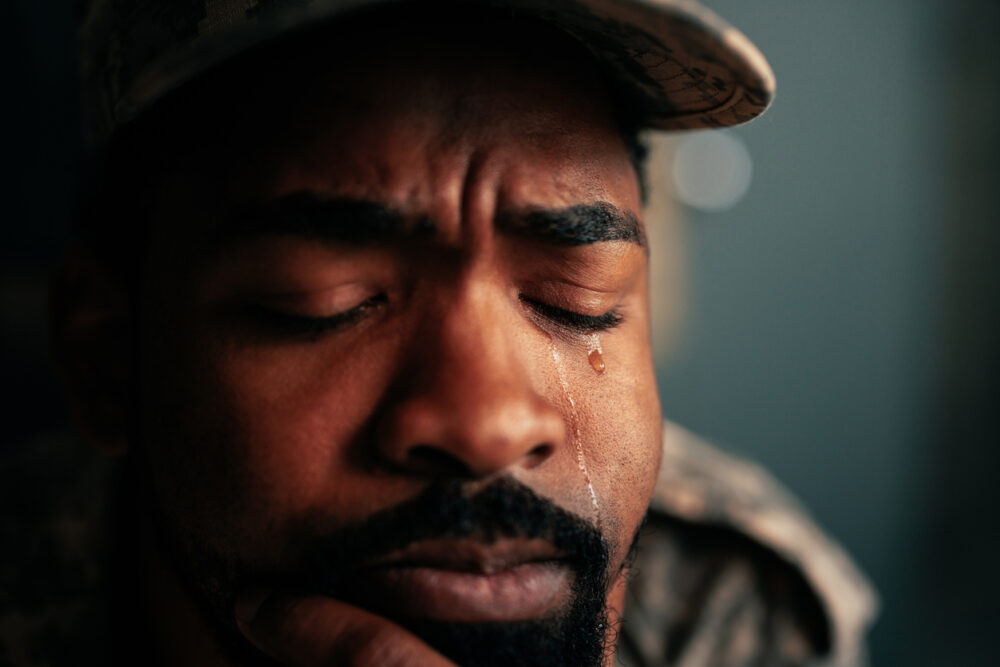A lifetime of holding it in doesn’t make anyone strong.

He might not cry at the movie. He might shrug when he’s hurting. He might joke instead of open up. But that doesn’t mean the feelings aren’t there. It just means he was never taught how to show them—and may have been punished when he tried. Masculinity doesn’t erase emotion. It teaches men to bury it, deny it, and power through it until they forget where they put it in the first place.
These emotional shutdowns don’t just happen out of nowhere. They’re reinforced—by culture, by peers, by families, and by survival. And while those patterns may protect boys from being labeled “weak” when they’re young, they leave grown men disconnected, lonely, and often silently grieving what they’ve never been allowed to feel. This isn’t about blaming individuals. It’s about seeing the cost of systems that punish vulnerability and mistake silence for strength.
1. Crying was labeled weakness before they knew what pain was.

For many boys, tears are shamed before they can even form full sentences. “Toughen up.” “Be a man.” “Quit crying or I’ll give you something to cry about.” These phrases might sound familiar because they’re everywhere. They teach boys early that pain isn’t to be expressed—it’s to be swallowed. Jill Anderson notes in Harvard EdCast that boys are often conditioned to suppress emotion early, which can later block their ability to form healthy, open relationships.
That shutdown doesn’t happen by nature—it’s enforced. And it creates a lifelong disconnect between feeling and expression, one that gets harder to bridge the longer it’s ignored.
2. They were praised for emotional numbness, not emotional awareness.

Most boys are rewarded when they “keep it together” and penalized when they show they’re overwhelmed. The more emotionally neutral they appear, the more mature they’re seen to be. That’s how numbness becomes a badge of honor. Anger is acceptable. Blankness is ideal. Vulnerability? That’s someone else’s problem.
Assael Romanelli explains in Psychology Today that many men grow up without learning how to identify or express their emotions, which can lead to deep emotional disconnection in adulthood.
Emotional literacy was never offered to them as a strength, so they never learned how to recognize what’s happening inside. Instead of processing, they suppress. And over time, that suppression becomes so normalized that even love, sadness, or tenderness feels foreign.
3.Touch became distant, guarded, or missing altogether.

Little kids cling, cuddle, and hold hands without shame. But at some point, touch between boys becomes policed. Comfort becomes weakness. Affection is suspicious. And unless it’s in the context of sports or sex, most men learn to stop reaching out—and to flinch when others reach toward them.
This creates deep loneliness. Human beings need safe, platonic touch to regulate their nervous systems and feel emotionally secure. When men are touch-starved, they may seek it only through sex or avoid it entirely. Dr. Thomas Stock reports in Men’s Health Clinic that long-term touch deprivation in men can lead to physical and emotional detachment, often worsening feelings of isolation.
4. Emotional labor was always someone else’s job.

In most homes, girls are raised to notice, name, and respond to emotions—while boys are told to “deal with it” alone. That divide doesn’t disappear in adulthood. Instead, women often carry the burden of managing emotional dynamics in relationships, while men are expected to remain stoic or detached. This doesn’t mean men don’t care. It means they were never taught how to participate.
If they freeze during conflict or go silent when asked how they feel, it’s not always a lack of interest—it might be a lack of tools. But emotional labor shouldn’t fall on just one side. When men are excluded from it early, they grow up unequipped and unseen.
5. They were taught to fix problems, not sit with pain.

Masculinity often frames value through usefulness. If something’s broken, fix it. If someone’s upset, solve it. But emotional pain doesn’t always have a fix—it needs presence. And for many men, being with pain without “doing” something about it feels intolerable.
This creates a dynamic where men either shut down or try to “logic” someone else’s feelings away. Not because they don’t care, but because they don’t know another way. They were never taught how to witness suffering without trying to control it. So when they can’t fix their own emotions—or someone else’s—they feel like they’re failing. And instead of staying, they withdraw.
6. Anger became the only emotion they were allowed to express.

For many boys, anger is the only feeling that ever gets validated. Crying earns ridicule. Fear gets dismissed. But anger? Anger is framed as power. It becomes the one emotional outlet that doesn’t cost them status, belonging, or masculinity. So all the other emotions—hurt, shame, loneliness—get funneled through that single, socially acceptable release valve.
By the time they become adults, this pattern is deeply ingrained. Instead of saying “I’m scared,” they shut down. Instead of saying “That hurt me,” they lash out. And even when they want to respond differently, many men don’t know how—because they were never shown what that looks like.
Anger isn’t the problem. It’s a signal. But when it’s the only emotion men feel safe showing, it becomes a mask for everything else they were never allowed to say. And behind that mask is often a deep well of grief that’s still waiting to be named.
7. Vulnerability made them targets, not teammates.

For many boys, opening up didn’t lead to comfort—it led to consequences. Crying in class, admitting fear, or sharing feelings in a friend group often meant becoming the punchline later. Vulnerability wasn’t rewarded—it was weaponized. And over time, boys learn to associate honesty with humiliation.
By adulthood, that fear doesn’t disappear. It just shifts form. Men may seem guarded, distant, or emotionally unavailable—not because they don’t care, but because they’ve been taught that expressing emotion puts them at risk. Even in safe spaces, the instinct to protect themselves runs deep. When vulnerability was once met with shame, silence becomes survival. This isn’t about men being incapable of connection—it’s about them not believing they’ll be safe if they show up fully. And until that belief is acknowledged, it’s hard for anyone—partner, friend, or therapist—to truly reach them.
8. They were expected to perform strength instead of ask for support.

From the time they’re small, many boys are praised for being “brave” and “strong”—but only when that strength looks like silence. They learn early that support is something to offer others, not something to receive. Admitting emotional pain becomes a liability, not a need. By the time they’re men, asking for help feels like a foreign language. Even when they’re suffering—through depression, anxiety, heartbreak, or loss—many men don’t believe they’re allowed to say it out loud. They fear being dismissed, ridiculed, or worse: being seen as weak.
So they white-knuckle their way through life, convinced that holding it together is the only proof of strength. But isolation isn’t resilience. It’s a trauma response wrapped in social approval. If we want men to show up differently, we have to stop celebrating emotional endurance and start honoring emotional honesty.
9. They’ve been taught to prioritize success over self-connection.

The message starts young: achieve more, win more, earn more. Boys learn that their worth is tied to productivity, not presence. Emotional self-awareness gets replaced with external validation. Over time, men become fluent in performance—but lose touch with how they actually feel beneath it. There’s always another milestone to chase, another metric to prove their value.
This relentless drive often masks a deep void. When everything is about doing, there’s no space left for being. Sadness gets buried under overwork. Grief hides behind goals. Vulnerability starts to feel like inefficiency. And eventually, many men reach a point of burnout or breakdown—because they’ve been succeeding at everything except listening to themselves. It’s not that men don’t want connection. It’s that they’ve never been shown how to value it over accomplishment. Relearning that isn’t weak—it’s revolutionary.
10. They’re stuck between outdated ideals and unclear expectations.

The old rules—be tough, stay silent, don’t feel—are slowly crumbling. But new models of masculinity haven’t taken their place in most people’s lives. Men are often caught in the middle: told to be more open, more sensitive, more self-aware, but still punished when they get it wrong. This double bind creates confusion, hesitation, and fear of messing up.
So many men want to show up differently—but they don’t know what “different” looks like in practice. They worry about being too much, not enough, or unintentionally harmful. Some retreat into silence out of guilt. Others lash out from defensiveness. But at the root is a shared uncertainty: How do I show up in a world that’s still deciding what masculinity is allowed to be? That limbo is exhausting. And without support, many men stay stuck in it—quietly wanting change, but unsure how to begin.
11. Intimacy often feels foreign—even when it’s what they crave.

For men taught to suppress emotion, real intimacy can feel almost unbearable. It requires vulnerability, presence, and the ability to stay when things get messy. But if emotional honesty has always felt risky, intimacy becomes something to fear instead of welcome.
Even in loving relationships, many men feel the urge to pull away the moment things get too deep. It’s not that they don’t care—it’s that they don’t feel equipped. Emotional closeness often feels like exposure, not safety. And for some men, the only models of closeness they’ve seen are physical or crisis-based. Learning how to be emotionally present in calm, healthy moments feels unfamiliar. But unfamiliar doesn’t mean impossible. It means unpracticed. And that’s something they can learn—with patience, safety, and the space to show up without shame.
12. Emotional neglect is invisible—and common.

Many men didn’t grow up in violent or abusive homes. But they did grow up without emotional validation. No one asked how they were really feeling. No one taught them to name sadness, fear, or vulnerability. They were expected to function without being supported. That’s emotional neglect—and it leaves deep, quiet wounds.
Unlike physical abuse, emotional neglect doesn’t leave visible scars. But it can lead to low self-worth, chronic disconnection, and trouble forming healthy relationships. It creates men who don’t know what they need, or how to ask for it. Not because they’re incapable—but because no one ever mirrored back that their emotions mattered. Until that silence is named for what it is, it keeps echoing through their lives—in loneliness, in withdrawal, and in the belief that feeling is optional.
13. They’re grieving things they were never allowed to lose.

Grief isn’t always loud. Sometimes it looks like detachment, short tempers, or overworking. And for many men, the grief they carry doesn’t stem from one single event—it comes from years of loss they were never allowed to name. The loss of vulnerability. The loss of emotional safety. The loss of friendships that faded because depth wasn’t permitted.
They grieve the boy who cried once and got mocked. The teen who needed help but stayed silent. The adult who wants connection but doesn’t know how to receive it. This kind of grief lives in the body, showing up in tension, fatigue, and a longing they can’t always explain. It’s not just sadness—it’s deprivation. And the moment men are allowed to name it, everything starts to shift. Not into blame—but into healing.